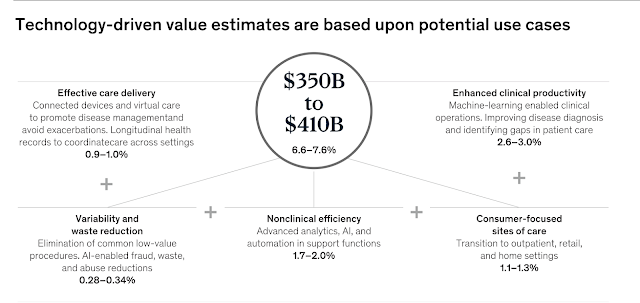How AI Is Predicting Which Cases of COVID-19 May Become Fatal
The idea of artificial intelligence being used to diagnose and treat disease has been used in science fiction for decades, with movies like Prometheus and Elysium (seen below) serving as examples. In these films, machines exist that can rapidly detect and treat illness as well as injury--and even perform a Cesarean section on a Xenomorph growing in your chest! While these machines may seem like typical science fiction nonsense to many, they are not as improbable as you might think.

By determining which patients will not develop acute respiratory distress syndrome (ARDS), which is one of the main causes of death associated with coronavirus, hospitals can free up beds and ventilators for patients that need them. The study, titled "Towards an Artificial Intelligence Framework for Data-Driven Prediction of Coronavirus Clinical Severity", showed the algorithm had an 80% success rate in predicting ARDS in the rather small sample size provided by the hospitals in Wenzhou. However, the team's findings are very encouraging, and with access to more data, the success rate could rise even higher.
The algorithm works by identifying which initial features of COVID-19 are indicative of ARDS in the later stages of the illness. According to the study, "A mildly elevated alanine aminotransferase (ALT) (a liver enzyme), the presence of myalgias (body aches), and an elevated hemoglobin (red blood cells), in this order, are the clinical features, on presentation, that are the most predictive" (Jiang et. al 1). The model is designed so that the more data it is provided with, the more accurate the predictions will be, as it uses past data to form parameters for each indicator. So, theoretically, when provided with a large enough sample, the model should become 100% precise in its predictions.
The success of the predictive models used in this study could offer a look into the future of medical diagnoses. Computer algorithms can look over data and form conclusions much faster than doctors, which could be life saving in certain scenarios. Regardless, it is apparent from this study--as well as the examples given in Nathan's blog post--that AI is a valuable tool in fighting the coronavirus.


Well done, Wes. I imagine there are tons of programmers/doctors out there trying to find any way possible to help ease the pressure on hospitals and determining which cases are most serious is obviously extremely helpful. My question is how they will be able to broadcast this algorithm to the majority of hospitals in the United States and around the world. I'm sure there will be hoops to jump through, but I'm assuming medical software companies will either be creating their own algorithms or reaching out to researchers like these in order to reach as many hospitals in the world as they can.
ReplyDeleteDo you think that as a direct result of the coronavirus we'll start to see a lot more of this kind of technology in the near future?
ReplyDeleteGreat article. While I agree that this technology helps easy off pressure from hospitals it's still not 100% accurate from get go. Do you think patients are willing to be the "data" for the algorithm is it trying to become better? Meaning are they willing to go home when the AI tells them that knowing AI could be wrong.
ReplyDeleteSam - I'm not sure how the logistics of implementing this algorithm would work. I'm assuming that if is does prove itself to be capable of saving lives, many hospitals or governments would pay to acquire it.
ReplyDeleteMaegan - Yes, I do. I think this pandemic is offering an opportunity for the advancement of medical technology and practices, and AI is a big part of that.
Omid - That's not the data the researchers need. The data used to fine tune the algorithm is the ALT levels, presence of myalgia, and hemoglobin levels.
I agree that there is definitely potential in this technology. Do you know how many more cases they want to analyze before they're willing to implement the AI into hospitals? Regardless I can't imagine it'll take too long. Unfortunately there are many cases in the US that can be used to test the algorithm.
ReplyDeleteWes, your article is really relevant to mine! On that end, I really think that in order for this technology to be fully applied in medical field, doctors and law-makers should agree on how high the success rate should be on how big the dataset is before actually using it to diagnose patients; otherwise, it would be too risky and unreliable.
ReplyDeleteThis comment has been removed by the author.
ReplyDeleteInteresting example of several fields (modeling, data science, medicine, computer science, etc) converging to advance artificial intelligence.
ReplyDeleteSince this is such essential technology, I'm curious about how they will distribute this across the globe. Would it be quite expensive that only a few places can afford it?
ReplyDeleteGreat article Wes! Do you know if the 80% success rate meant? Did 20% of the people predicted to develop ARDS not get it or did it somehow take into account the false negatives -- the people who were told they did not need close attention but in reality developed severe symptoms?
ReplyDeleteWe have seen examples of this type of moral dilemma of who is in more desperate need of care in instances like World War 2 and 9/11. Does AI making the decision for doctors on who is in more need of their assistance make it easier or harder for doctors? They still have to turn away patients but they are no longer the ones making that decision.
ReplyDeleteVery timely & interesting stuff here -- however, it's not true that you are guaranteed to keep getting better performance (i.e. up to 100%) by adding more data. More data could help, but it could be that the features the algorithm has for input are not sufficient to predict the results, or that there is some randomness in the outcome that cannot always be predicted.
ReplyDelete